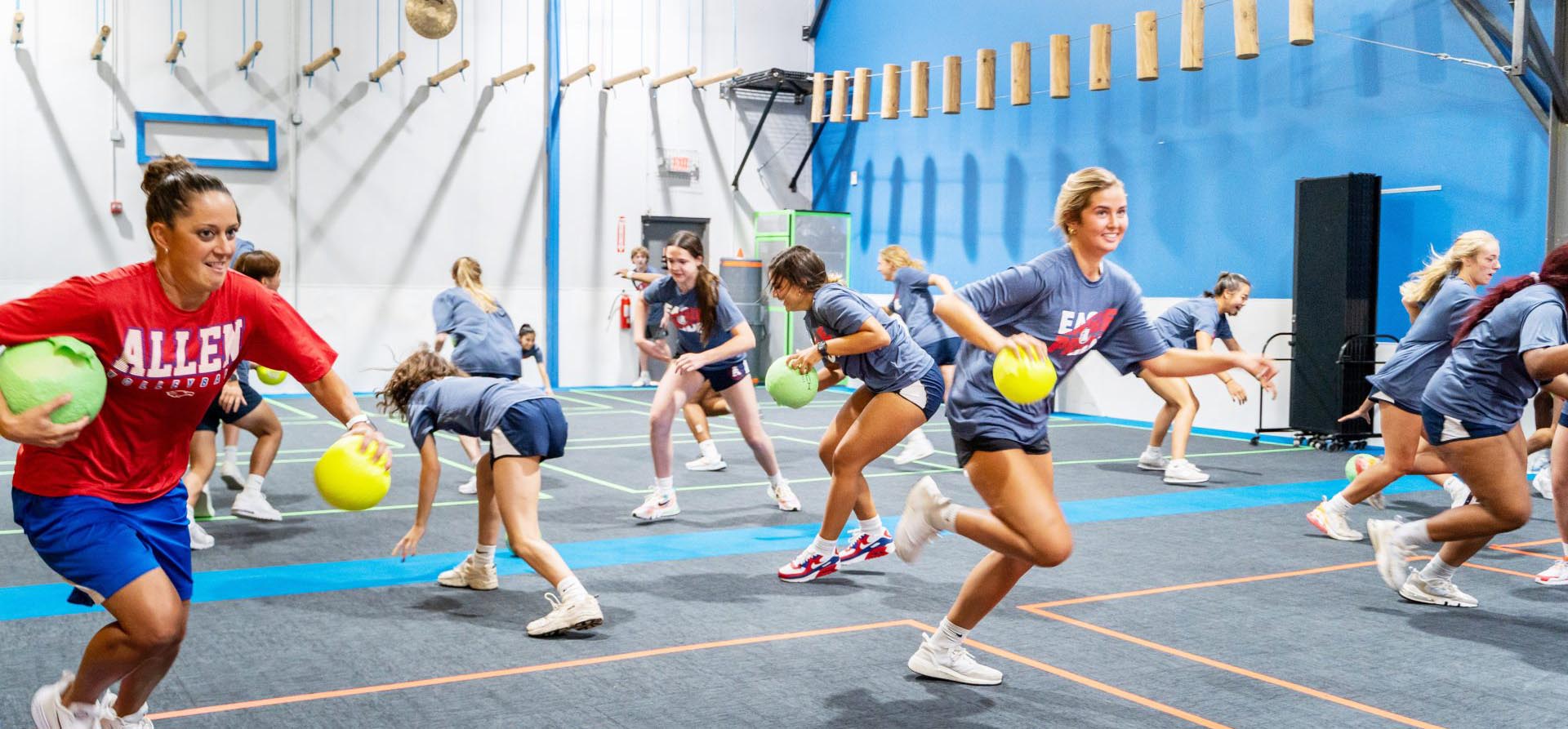
Winning victories in school sports and teenage sports organizations isn’t a one-person goal. A good team has members with excellent communication and collaboration. Team building events are a great way to foster team relationships, so scheduling a team-building activity at least once a year can benefit your student athletes’ performance.
Whether you’ve got a group of seasoned teens who need a refresher course to revitalize their team spirit or a newly-made team that needs to establish camaraderie, we’ve got you covered. We’ve compiled a list of 11 easy and fun team bonding activities for sports teams to help your teen athletes build relationships and work together.
Give Your Sports Team a COMPETITIVE Advantage
and enable them to excel both on and off the field.
Give Your Sports Team a COMPETITIVE Advantage
and enable them to excel both on and off the field.
Also Read:
Table of Contents
Top 4 Team Bonding Activities
1. Duck and Cover
Duck and Cover is a simple, straightforward game that can be a good game to introduce new and familiar team members. This is one of the best team building games for students at the start of the season if there are new faces or most of your team members don’t know each other well yet.
Check out this video for a quick demonstration!
Duck and Cover is a fun way to build teamwork and communication skills while encouraging participants to stay alert and focused. This makes it an excellent addition to any team bonding activity repertoire.
2. Duct-Tape Skis
This team bonding game is all about using communication in smaller groups. You’ll need duct tape, small objects, and buckets or baskets.
In a large room, split your team into two or more groups. Scatter objects between two sides of the room. Give each group two rolls of duct tape. Using the duct tape, all but one or two members must connect their feet at the ankle. The remaining members who weren’t connected will be the designated “repair people.”
As a group, they must move to pick up objects one at a time and drop them into buckets. If the duct tape is broken at any point, the repair people must run out to find a way to reconnect their group. The game is over once all of the objects are retrieved.
Here’s the trick: notice the word “team” is never used. They were split into groups, and the goal was to retrieve the objects. However, all groups could have worked together to harvest the objects and end the game faster. Ask them, “How could we have completed this faster?” or “Who was on your team?” to hammer home the point of the game.
3. Slow Motion Tag
Here’s a great group activity that will get your team moving!
Let your team scatter around a large room. Every time you blow a whistle, everyone must take a step – how big or small the step is is up to them. If they choose to tag someone, that person is frozen and must kneel or sit. If a frozen team member is tagged, they are back in the game.
Don’t give your players any goals or objectives. Watch as they start to form alliances or find out how they should win. This game is about communication: what was heard versus what was explained. People may start to play differently because of a lack of communication and goals.
4. Don’t Touch Me
This fun game teaches communication and how different players can perceive the directions. Have every player find a partner and then form a big circle so that every player’s partner is standing across from them on the other side of the circle. In the middle of the circle, place an item.
Provide them with these three exact rules, stressing these words:
- You must make “contact” with the item in the middle
- You must switch “positions” with your partner.
- You must say the phrase “Don’t touch me”.
The goal is to do this in the shortest amount of time possible. The players can do this however they like, allowing everyone in the group to try multiple ideas rather than just one idea led by one person.
Here’s the trick: your players will likely run to the center, touch the item, and switch spots with their partner. However, the simpler solution is to make eye contact with the item and stand the way their partner is standing, thus switching positions. The point of this game is to see how they interpret the instructions and how the instructions could have been better communicated.
7 More Team Bonding Games
5. Human Knot
This is one of the more fun team bonding activities for sports groups that want to play around with their flexibility, coordination, and communication.
Players stand in a circle, and all rush to the center and grab the hand of someone random. The players must untangle themselves without letting go to form a circle again. This activity encourages communication, problem-solving, and cooperation as athletes work together to unravel the knot. It also fosters trust and teamwork as they rely on each other to succeed.
6. Minefield
Skip the trust exercises and give your players a fun way to build trust and listening skills. Set up an obstacle course with objects scattered on the ground. Blindfold one participant at a time and have their teammates guide them through the course using only verbal instructions.
The minefield game enhances communication skills and trust as athletes learn to listen and rely on their teammates for guidance. It also emphasizes the importance of clear communication and teamwork under pressure.
7. Balloon Tower
This game allows players to explore their creativity and think outside the box. Divide your team into small groups. Provide each group with inflated balloons and tape. Within a set time, teams must try to build the tallest balloon tower only using balloons and tape.
This activity promotes creativity, problem-solving, and collaboration as teams brainstorm ideas and construct the tower. It reinforces the value of teamwork and encourages athletes to leverage each other’s strengths.
8. Memory Wall
This is great for an end-of-year activity to cap off the school year or for teams where most players aren’t new. Create a memory wall or bulletin board where athletes can post photos, quotes, and memorable moments from their sports experiences. Encourage athletes to contribute and reflect on their shared journey.
This activity strengthens team identity and morale by celebrating achievements and reinforcing shared values. It fosters team bonding, nostalgia, and camaraderie as athletes reminisce about past victories, challenges, and bonding moments. After sharing these memories, consider the achievements your team can look forward to throughout the rest of the year.
9. Fitness Challenge Relay
Design a series of fitness challenges or exercises and set up stations for each challenge. Divide athletes into teams and have them compete in a relay race, completing each challenge before moving on to the next. Whichever team finishes all challenges first is the winner.
As athletes, basic fitness challenges and exercises shouldn’t be an issue. This activity promotes physical fitness, teamwork, and friendly competition as athletes push themselves to do their best while supporting each other through the challenges. It fosters camaraderie and motivation as teammates work together. It’s also a good time to check your team’s fitness levels.
10. Team Seek and Find
This can be done within a set time or throughout the entire event if you’re having a multi-day team-building event. Give players a list of items they can match with a particular teammate. For example, they must find someone with the same number of siblings, someone who likes to sing, or someone who can speak a second language. By the end of the time limit, they should have a minimum number of teammates on their list.
This activity is a great way for players to get to know each other, especially to learn new things about them.
11. Group Juggle
Form a large circle and give one person a soft object, such as a small pillow or a juggling ball. That person should toss it to someone else in the circle. As the game progresses, more objects are introduced, and participants must keep all objects moving without dropping any.
This activity improves focus, coordination, and teamwork as athletes coordinate their movements to keep the objects in motion. It fosters trust and reliance on each other’s abilities, reinforcing the importance of working together toward a common goal.
Team Bonding Activities for Sports
Why you should schedule team bonding activities for your sports teams at least once a Year
Hosting a team building activity for your student-athletes isn’t just a fun day out for your team. It’s a strategic way to invest in your team’s success by building relationships with one another. With well-designed team-building activities, you can help your students through:
Building Trust and Camaraderie:
Activities foster trust and unity, strengthening bonds among teammates beyond sports. Shared challenges and experiences create a deeper sense of camaraderie and mutual respect.
Improving Communication:
Encourage open dialogue and collaboration. Athletes hone communication skills and learn to understand each other better, enhancing teamwork and cohesion during games and practices.
Boosting Morale and Motivation:
Reignites enthusiasm and commitment. Fun activities and shared experiences uplift spirits, renewing athletes’ motivation and dedication to their goals on and off the field.
Encouraging Leadership and Accountability:
This program provides opportunities for athletes to lead by example and support teammates, especially team captains. It cultivates leadership skills and fosters a culture of accountability and mutual support within the team.
Reduces Conflict and Resentment:
Addressing tensions and conflicts in a supportive environment prevents resentment, fostering healthy relationships and a positive team atmosphere.
Facilitates Goal Setting:
Aligns team vision and priorities. Discussions during bonding activities foster a shared sense of purpose and commitment to collective success, driving motivation and focus.
Student & Youth
Team Building Events
Student & Youth
Team Building Events
Building champions starts with a strong team bond. Build your team’s relationships at Group Dynamix!
Team bonding activities play a crucial role in the development and success of student-athletes both on and off the field. By participating in team building activities for teens in sports groups, student-athletes can foster a strong sense of camaraderie and unity, translating to better coordination and collaboration during games.
If you’d like to see more of what we do, watch the videos below and see a small glimpse of activities we use to make teams work together better or schedule your team bonding event here.
Interested in scheduling a Youth event with us? Click here to learn more, or contact us at (972) 416-9646.
If you can’t come to us, we can come to you. Learn more about our Portable Events and schedule a fun student-athlete team-building day in any venue of your choice.

Good morning and hope all is well. Do you have any curriculum to support team work or team bonding? Does your company actually run these types of events?
Hi Jarrod! We do not have curriculum written, other than the blogs we publish and our train-the-trainer workshop resources we create. And yes, Group Dynamix organizes and run team bonding events for schools, corporations, non-profits, sports teams, and many more. Reach out to us either at (972) 416-9646 or via our inquiry form groupdynamix.com/request-a-quote/ to learn more about our events and how we can help connect your group.